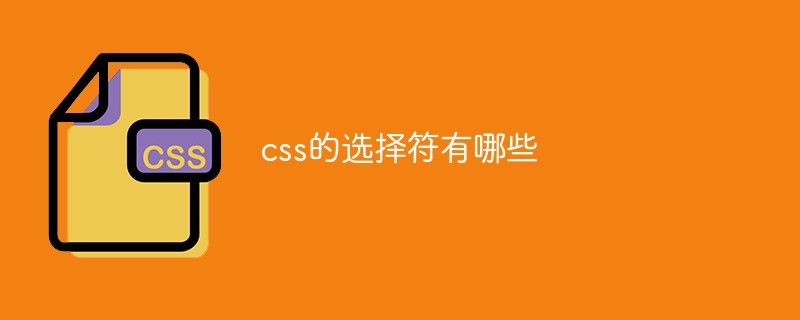css的选择符有哪些
- 青灯夜游原创
- 2021-04-28 13:50:337276浏览
css选择符有:1、通配选择符“*”;2、id选择符;3、类选择符;4、标签选择符;5、相邻选择符“E+F”;6、子选择器“E>F”;7、后代选择符“E F”;8、伪类和伪元素选择符,例如“:first”;9、属性选择符。

本教程操作环境:windows7系统、CSS3&&HTML5版、Dell G3电脑。
css选择符(选择器)是用来规定css样式用于哪一个或哪一些dom元素的一种规范。
每一条css样式定义由两部分组成,形式如下:选择器{样式} 在{}之前的部分就是“选择器”。
“选择器”指明了{}中的“样式”的作用对象(dom对象),也就是“样式”作用于网页中的哪些元素。
css选择符(选择器)有哪些?
1、通配选择符( * ):匹配任意元素。
2、id选择符( # myid):匹配 ID 等于“myid”的任意元素 。
3、类选择符(.myclassname):匹配 class 等于“myclassname”的任意元素.
4、标签选择符(div, h1, p):选择指定元素名称的所有元素。
5、相邻选择符(E + F):用于选择(不是内部)指定的第一个元素之后紧跟的元素。
6、子选择符(E > F):用于选取带有特定父元素的元素,例ul > li,选择所有父级是
- 元素的每个
- 元素。(学习视频分享:css视频教程)
7、后代选择符(E F):用于选取元素内部的元素。
8、伪类和伪元素选择符:用于向某些选择器添加特殊的效果。
:active :any-link :blank :checked :current :default :defined :dir() :disabled :drop :empty :enabled :first :first-child :first-of-type :fullscreen :future :focus :focus-visible :focus-within :has() :host :host() :host-context() :hover :indeterminate :in-range:invalid :is() :lang() :last-child :last-of-type :left :link :local-link :not() :nth-child() :nth-col() :nth-last-child() :nth-last-col() :nth-last-of-type() :nth-of-type() :only-child :only-of-type :optional :out-of-range :past :placeholder-shown :read-only :read-write :required :right :root :scope :target :target-within :user-invalid :valid :visited :where() 9、属性选择符:选择带有特定属性的元素。
[attribute]:用于选取带有指定属性的元素。
[attribute=value]:用于选取带有指定属性和值的元素。
[attribute~=value]:用于选取属性值中包含指定词汇的元素。
[attribute|=value]:用于选取带有以指定值开头的属性值的元素,该值必须是整个单词。
[attribute^=value]:匹配属性值以指定值开头的每个元素。
[attribute$=value]:匹配属性值以指定值结尾的每个元素。
[attribute*=value]:匹配属性值中包含指定值的每个元素。
更多编程相关知识,请访问:编程入门!!
以上是css的选择符有哪些的详细内容。更多信息请关注PHP中文网其他相关文章!

